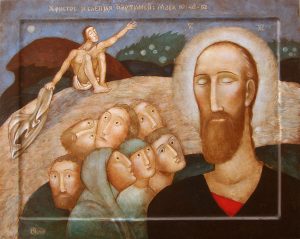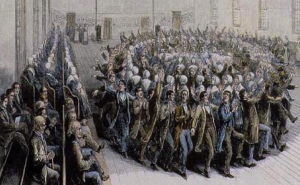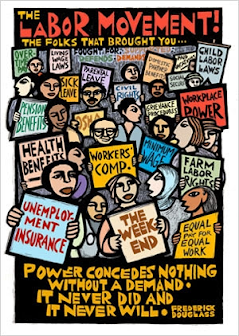 When you sit there in the pew and I stand here in the pulpit and say to you “The Bible says this . . . .” or “The Church teaches that . . . .”, how do you know that I’m telling you the truth? When the writer of the Letter to Hebrews admonishes you to “approach [the sanctuary of God] with a true heart in full assurance of faith,” how do you have that assurance? When that writer, again, encourages you to “hold fast to the confession of our hope without wavering,” how do you know what that confession is? And when Jesus commands you, “Beware that no one leads you astray,” how do you make the judgment to exercise that caution? In a word, how do you determine what is true?
When you sit there in the pew and I stand here in the pulpit and say to you “The Bible says this . . . .” or “The Church teaches that . . . .”, how do you know that I’m telling you the truth? When the writer of the Letter to Hebrews admonishes you to “approach [the sanctuary of God] with a true heart in full assurance of faith,” how do you have that assurance? When that writer, again, encourages you to “hold fast to the confession of our hope without wavering,” how do you know what that confession is? And when Jesus commands you, “Beware that no one leads you astray,” how do you make the judgment to exercise that caution? In a word, how do you determine what is true?
I submit to you that all of those questions have one answer: on-going Christian formation, lifelong Christian learning, adult Christian education, call it what you will it boils down to the same thing – using, on a regular basis, the sense, reason, and intellect with which God has endowed us to enter into ever-deepening understanding of our faith. And it begins, as our opening collect suggested, with hearing, reading, marking, learning, and inwardly digesting the Holy Scriptures.
Blessed Lord, who caused all holy Scriptures to be written for our learning: Grant us so to hear them, read, mark, learn, and inwardly digest them, that we may embrace and ever hold fast the blessed hope of everlasting life, which you have given us in our Savior Jesus Christ; who lives and reigns with you and the Holy Spirit, one God, for ever and ever. Amen.[1]
One of the first things Thomas Cranmer, the first Reformed Archbishop of Canterbury, did after being appointed in 1533 was to convince King Henry VIII to publish an English translation of the Holy Bible and to authorize its public use. Cranmer hired Myles Coverdale to undertake the task and between April of 1539 and December of 1541 seven printings of this translation were made. Because of its large physical size, it was called The Great Bible. Copies of it were distributed to every church in England, chained to pulpits or lecterns, and there made available to any literate person who wished to come and read the Holy Scriptures for themselves. In addition, a reader was provided in every church so that the illiterate could hear the Word of God in plain English.
Cranmer then undertook, with the assistance of other bishops and scholars, to translate the church’s liturgy from medieval Latin into the common English of the day. He is the chief architect of The Book of Common Prayer, the first edition of which was published in 1549. Cranmer’s vision was of an English national church gathered in household units each morning and evening, gathered in parish churches each Sunday morning, reading through most of the Bible each year. His vision was of a Christian people who would be, in the words of one of our Lenten prayers, “fervent in prayer and in good works.”[2] Fervent – on fire – energized for their mission “to represent Christ and his Church; to bear witness to him wherever they may be; and . . . to carry on Christ’s work of reconciliation in the world.”[3]
Our church continues that tradition with that same vision today through a Daily Office lectionary which leads us through almost the whole of Scripture over the course of two years and a Eucharistic lectionary (which we now share with many other mainstream Christian denominations) that guides us through most of the New Testament in a three-year cycle and much of the Old Testament in a six-year cycle. In this, we continue what Australian priest and author Adam Lowe has called the “extremely strong tradition” of “Anglican openness to the Bible.” (He wrote that on an internet blog in an entry posted on October 29, 2010, which is sadly no longer available; the website has expired. I mention that expiration now and will return to it in a bit.)
When Cranmer and his colleagues devised the annual cycle of prayer and reading embodied in the Prayer Book, they created also the cycle of weekly collects which begin Sunday worship services. On the First Sunday of Advent each year, their calendar of collects bid the church pray for God’s grace to “cast awaye the workes of darknes, and put upon us the armour of light.”[4] We still offer that same prayer on Advent 1. On the Second Sunday of Advent, they prescribed the original version of the collect which we now pray on this, the penultimate Sunday of the church year.
Although the “collect of the day” is (according to the rubrics in the BCP) normally said only by “the Celebrant,” today I asked that we all read that prayer together. I did so to underscore the corporate nature of that and every prayer said during worship; the Presider does not pray alone. The word “Amen,” in which the congregation joins at the end of every prayer, is a Hebrew word meaning “So be it.” It means, “Yes! We agree. We said that prayer with you. That’s our prayer.” So, this morning, we made it our prayer not only in agreement but in fact, our prayer and our commitment that we, each one of us and all of us together, will “hear [the holy Scriptures], read, mark, learn, and inwardly digest them.” We Anglicans have all been making that commitment, at least once a year, for 469 years!
We’ve been making that commitment, but let’s be honest, we’ve not been very good at keeping it. Even though our church teaches – in something called “the Charter for Lifelong Christian Formation” – that “faith formation . . . is a lifelong journey with Christ, in Christ, and to Christ,” a lifelong process of “growth in the knowledge, service, and love of God as followers of Christ . . . informed by scripture, tradition, and reason,” I’ve been told by adult members of our church that (and I quote) “I don’t need any adult education.” Well . . . I can only tell you my experience.
When I moved back to Las Vegas as an adult in 1976 and, after a half-dozen years of not being active in the church, decided to attend Christ Episcopal Church, one of the first things I was invited to do was attend an adult education class. I’m glad I accepted the invitation. For the next dozen years I took part in at least one adult study every year, then I read for Holy Orders and got ordained, and for the last almost-30 years as a professional clergy person I have studied Scripture and church tradition nearly every day . . . and I still learn things. In fact, preparing for this sermon this past week I learned some things about The Great Bible that I hadn’t known before.
I believe that what our bishop calls the “tag line” of the Diocese of Ohio – “God Loves Everyone – No Exceptions” – is unqualifiedly true. With equal fervor, I believe that the statement, “I don’t need any adult education,” is unqualifiedly false. No one is ever too young, too old, or too knowledgeable to learn. And when we don’t make the effort and take the opportunity to do so, our commitment diminishes, the fire dies, the energy dissipates, and (in the words of our Ash Wednesday litany) we “fail to commend the faith that is in us.”[5]
So we have prayed every year for the grace to “hear, read, mark, learn, and inwardly digest” the Holy Scriptures, and by so praying have committed ourselves to undertake the lifelong Christian formation that that implies, but what do these five educational activities entail? English priest and poet Malcolm Guite has called them “five glorious verbs” which “deepen as they follow one another in intensity of engagement.”[6]
Of hearing, Guite writes that this is “where most people, at the time of [our opening collect’s] composition would start; with hearing! Most people weren’t literate, and though the reformers had made sure a Bible ‘in a language understanded of the people’ was set in every church, most people had to hear it read aloud by someone else.” And many people are still there, at the hearing stage. We may hear the words proclaimed in worship and preached on from the pulpit, but though we may have a Bible in our homes, it is seldom opened. We really have to take the next step of our commitment: we have to read Holy Scripture ourselves.
Guite correctly notes that “the translation of the Bible into English was the single greatest spur to the growth of literacy in the English-speaking world and Bible translation remains today one of the great drivers of literacy and education with all the good that follows.” It was the Renaissance scientist Galileo Galilei who said, “I do not feel obliged to believe that the same God who has endowed us with sense, reason, and intellect has intended us to forgo their use.”[7] When we fail to read the Bible, we do forego their use, but when we study Scripture and tradition for ourselves we honor these gifts of God, with all the literacy, education, and good that flow from them.
The third verb in our prayer is “mark,” which in Cranmer’s day meant simply to “pay attention.” I’m one of those people who actually does mark pages as I read. My books (including my study Bible) are filled with color-coded highlights and marginal notations. Guite suggests that the action flows in both directions, that when we study the words of God they “underscore in us those passages which are marked out by God to make their particular mark in us.”
We all know what “learning” is; it happens when (as the dictionary tells us) we “acquire knowledge of or skill in [something] by study, instruction, or experience.” Guite reminds us, though, that we often talk of “learning by heart” and drawing on that he describes learning as creating pathways in and through our hearts. He tells the story of visiting an elderly woman suffering dementia when he was newly ordained:
At a loss as to how to pray I began to recite the 23rd psalm. Suddenly I became aware of a voice beside me, faint at first but growing stronger. It was the old woman joining in through laboured breath. I had a strong sense that the person speaking these words was not the wandered old lady but the little girl who had learnt them all those years ago. We made it to the end of the psalm together and she died peacefully as I was saying the Gloria. “I will dwell in the house of the Lord forever” were the last words on her lips.
Though dimmed with age and dementia, the fervor, the fire, the energy of her learning still coursed the pathways in and through her heart.
And, finally, our collect commits us to “inwardly digest” what we hear, read, mark, and learn. Guite reminds us of Jesus words to Satan, “One does not live by bread alone, but by every word that comes from the mouth of God.”[8] Says Guite, “We are to live on, and be sustained by scripture just as we live on and are sustained by bread, to take it in daily till it becomes transformed into part of the very substance of who we are, giving us new strength.” Daily, lifelong learning gives us the fervor, the fire, the energy needed for life.
What I have just said to you, I have said before. In fact, nearly everything I’ve just said is an almost verbatim repeat of a sermon I preached three years ago when we introduced the JOLT! intergenerational learning program which sadly only lasted for two years. Back then, that blog of Australian Anglican Adam Lowe was up and running and I could have given you a web address where you could read all that he had written about bible study; it was very good and I’m sad to have learned that it’s been wiped away like so many stray electrons.
And that’s a problem in our world. Friday, I listened to the NPR program Science Friday on which there was a segment with a neuroscientist named Maryanne Wolf who has recently published a book entitled Reader, Come Home[9] in which she explores the differences between reading from an actual, printed, ink-on-paper book and reading from a computer screen or a digital “reader.” She asserts that:
Human beings were never born to read. The acquisition of literacy is one of the most important epigenetic achievements of Homo sapiens. To our knowledge, no other species ever acquired it. The act of learning to read added an entirely new circuit to our hominid brain’s repertoire. The long developmental process of learning to read deeply and well changed the very structure of that circuit’s connections, which rewired the brain, which transformed the nature of human thought.[10]
And she argues on the basis of research data that reading on a computer screen or digital “reader” rewires the brain in other ways. Particularly, the data show that such reading encourages what she calls “skimming” rather than the “deep reading” that physical, printed material encourages. What electronic readers are reading is not being “consolidated in their reservoirs of knowledge. This means that . . . their capacity to draw analogies and inferences when [and from what] they read will be less and less developed.”[11] The “deep reading” encouraged by reading from a printed text, she said, gives us “the time to critically analyze and evaluate the truth of what we are reading;” it gives us “an opportunity to engage our feelings of empathy and also our engagement with alternative viewpoints.”[12]
On the other hand, the “skimming” encouraged by reading from an electronic screen leads to a loss of the ability to engage in critical analysis and to develop insight.
Reading from a computer or a digital “reader” discourages deep reading in three ways. First, the very act of using an electronic screen predisposes the reader to an expectation of “evanescence.” This encourages us to read quickly, to skim over the material rather than linger on it thoughtfully. In the words of our Bible Sunday collect, we don’t take time to “mark” what we are reading. Second, digital formats discourage what Dr. Wolf called “recursion,” the going back to reread and reconsider something from a prior page. And this, in turn, inhibits the third element of “deep reading,” what she called “comprehension monitoring,” that internal process of self-checking our understanding. This is the “inward digesting” which we prayed God would give us in regard to Holy Scripture.
We live in a world of digitized information which appears and disappears, which flits by and is gone, to which we devote little time or attention, which we skim, do not reread or critically reconsider, and whose effect on us we do not monitor. We must make the effort to “read, mark, learn, and inwardly digest,” not only the Scriptures, but all forms of written communication, else we will not be able to “analyze and evaluate the truth of what we are reading.”
This is the danger about which Jesus warned. “Beware,” he said, “that no one leads you astray.”[13] Jesus spoke of “wars and rumors of wars;” he might in our world speak of tweets, of Instagram, of Facebook postings, or of blogs and websites which come and go. These things can be and often are filled with lies and distortions which distract us from the truth and, because of their impermanence, they render us unable to distinguish truth from falsehood. “Beware that no one leads you astray!”
The truth, said Jesus, will make us free.[14] May we hear the truth, read, mark, learn, and inwardly digest it, that we may embrace and hold fast to freedom. Amen.
====================
This homily was offered by the Rev. Dr. C. Eric Funston on the 26th Sunday after Pentecost, November 18, 2018, to the people of St. Paul’s Episcopal Church, Medina, Ohio, where Fr. Funston is rector.
The lessons used for the service (Proper 28, Year B, Track 2) are Daniel 12:1-3; Psalm 16; Hebrews 10:11-25; and St. Mark 13:1-8. These lessons can be found at The Lectionary Page.
====================
Notes:
Click on footnote numbers to link back to associated text.
[1] Proper 28, The Book of Common Prayer 1979, page 236
[2] Preface for Lent, BCP 1979, page 379
[3] Catechism, BCP 1979, page 855
[4] The Book of Common Prayer of 1549
[5] BCP 1979, page 268
[6] Bible Sunday: Hear, Read, Mark, Learn, and Inwardly Digest!, Malcolm Guite Blog, October 23, 2016, online
[7] Letter to the Grand Duchess Christina, 1615
[8] Matthew 4:4
[9] Wolf, Maryanne, Reader, Come Home: The Reading Brain in a Digital World (HarperCollins, New York:2018)
[10] Excerpt from Reader, Come Home, published on the Science Friday website, November 16, 2018, online
[11] Ibid.
[12] Audio recording of radio program segment, Science Friday website, November 16, 2018, online
[13] Mark 13:5
[14] John 8:32
 If I were preaching this coming Sunday (which I’m not … but if I were …), I’d look at darkness. Strange choice, perhaps, for the Sunday after Christmas Day, but the Episcopal Church lectionary always specifies the prologue of John’s Gospel as the gospel lesson for this Sunday and it includes that verse: “The light shines in the darkness, and the darkness did not overcome it.”[1]
If I were preaching this coming Sunday (which I’m not … but if I were …), I’d look at darkness. Strange choice, perhaps, for the Sunday after Christmas Day, but the Episcopal Church lectionary always specifies the prologue of John’s Gospel as the gospel lesson for this Sunday and it includes that verse: “The light shines in the darkness, and the darkness did not overcome it.”[1] When you sit there in the pew and I stand here in the pulpit and say to you “The Bible says this . . . .” or “The Church teaches that . . . .”, how do you know that I’m telling you the truth? When the writer of the Letter to Hebrews admonishes you to “approach [the sanctuary of God] with a true heart in full assurance of faith,” how do you have that assurance? When that writer, again, encourages you to “hold fast to the confession of our hope without wavering,” how do you know what that confession is? And when Jesus commands you, “Beware that no one leads you astray,” how do you make the judgment to exercise that caution? In a word, how do you determine what is true?
When you sit there in the pew and I stand here in the pulpit and say to you “The Bible says this . . . .” or “The Church teaches that . . . .”, how do you know that I’m telling you the truth? When the writer of the Letter to Hebrews admonishes you to “approach [the sanctuary of God] with a true heart in full assurance of faith,” how do you have that assurance? When that writer, again, encourages you to “hold fast to the confession of our hope without wavering,” how do you know what that confession is? And when Jesus commands you, “Beware that no one leads you astray,” how do you make the judgment to exercise that caution? In a word, how do you determine what is true? Today is the first Sunday in November which means that instead of the normal sequence of lessons for Ordinary Time, we are given the option of reading the lessons for All Saints Day, which falls every year on November 1. So today we heard a reading from the Wisdom of Solomon (a part of the apocrypha in which we hear that the righteous are in the hand of God), a psalm reminding us that the saints pledge themselves to truth rather than falsehood, a bit of the Book of Revelation describing the “new Jerusalem” where God will make God’s home with the saints, and (oddly enough) to the story of the raising of Lazarus in John’s Gospel.
Today is the first Sunday in November which means that instead of the normal sequence of lessons for Ordinary Time, we are given the option of reading the lessons for All Saints Day, which falls every year on November 1. So today we heard a reading from the Wisdom of Solomon (a part of the apocrypha in which we hear that the righteous are in the hand of God), a psalm reminding us that the saints pledge themselves to truth rather than falsehood, a bit of the Book of Revelation describing the “new Jerusalem” where God will make God’s home with the saints, and (oddly enough) to the story of the raising of Lazarus in John’s Gospel. Two weeks ago, Mark told us the story of the rich man who came to Jesus asking “What must I do to inherit eternal life?”
Two weeks ago, Mark told us the story of the rich man who came to Jesus asking “What must I do to inherit eternal life?” Christology is one of those odd words of the Christian tradition that one doesn’t hear much in church but which one hears a lot in academic circles. Christology is defined as “the field of study within Christian theology which is primarily concerned with the ontology and person of Jesus as recorded in the canonical Gospels and the epistles of the New Testament.”
Christology is one of those odd words of the Christian tradition that one doesn’t hear much in church but which one hears a lot in academic circles. Christology is defined as “the field of study within Christian theology which is primarily concerned with the ontology and person of Jesus as recorded in the canonical Gospels and the epistles of the New Testament.” Our gradual this morning asks a question of God about human existence:
Our gradual this morning asks a question of God about human existence: The collect for today from The Book of Common Prayer:
The collect for today from The Book of Common Prayer: Last week we began our parish’s annual fund campaign with the theme “Transforming Generosity.” You should have received your pledge card for 2019 together with a letter about the nature of stewardship and generosity. There was an article in the newsletter similar to that letter, and early in the week you received an email (if you receive email) which is repeated on an insert in your bulletin this morning. Your parish leadership team has asked and will continue to encourage you to do two things that may seem contradictory: first, to make your financial commitment for 2019 earlier than usual, and second, to take your time in doing so. Our hope is that you will submit your estimates of giving on or before the first Sunday in November, but that you will give real prayerful and careful consideration to how your financial support of your church reflects your relationship with God. Stewardship, as that letter said, is not a matter of fund raising; stewardship is a matter of spiritual health. The “Transforming Generosity” theme hopes to inspire you to be a faithful steward and so to give as an expression of your relationship with God.
Last week we began our parish’s annual fund campaign with the theme “Transforming Generosity.” You should have received your pledge card for 2019 together with a letter about the nature of stewardship and generosity. There was an article in the newsletter similar to that letter, and early in the week you received an email (if you receive email) which is repeated on an insert in your bulletin this morning. Your parish leadership team has asked and will continue to encourage you to do two things that may seem contradictory: first, to make your financial commitment for 2019 earlier than usual, and second, to take your time in doing so. Our hope is that you will submit your estimates of giving on or before the first Sunday in November, but that you will give real prayerful and careful consideration to how your financial support of your church reflects your relationship with God. Stewardship, as that letter said, is not a matter of fund raising; stewardship is a matter of spiritual health. The “Transforming Generosity” theme hopes to inspire you to be a faithful steward and so to give as an expression of your relationship with God.
 At the end of our gospel lesson this morning, Jesus said to the crowd, “It is my Father who gives you the true bread from heaven. For the bread of God is that which comes down from heaven and gives life to the world.” They said to him, “Sir, give us this bread always.” Jesus answered, “I am the bread of life. Whoever comes to me will never be hungry, and whoever believes in me will never be thirsty.”
At the end of our gospel lesson this morning, Jesus said to the crowd, “It is my Father who gives you the true bread from heaven. For the bread of God is that which comes down from heaven and gives life to the world.” They said to him, “Sir, give us this bread always.” Jesus answered, “I am the bread of life. Whoever comes to me will never be hungry, and whoever believes in me will never be thirsty.”

